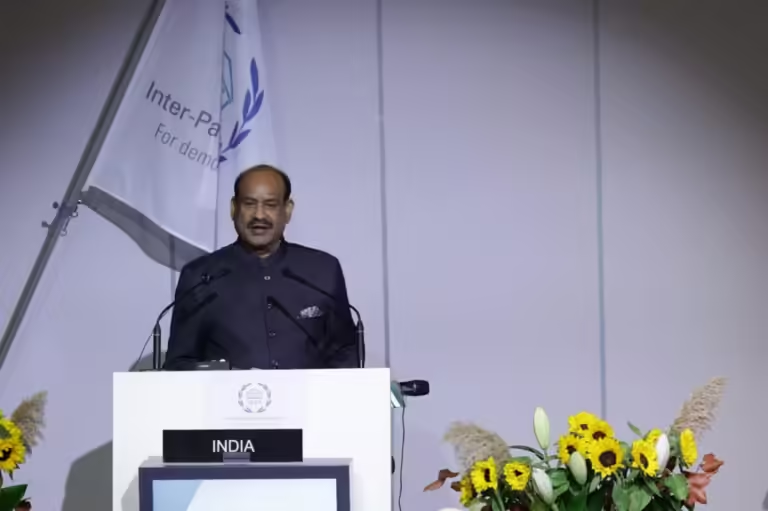Lok Sabha Speaker Om Birla, leading an Indian Parliamentary Delegation at the 149th Assembly of the Inter-Parliamentary Union (IPU) in Geneva, emphasised the importance of multilateralism in his address on subject of “Harnessing science, technology and innovation for a more peaceful and sustainable future”.
He advocated for equitable sharing and responsible use of technological advancements and highlighted India’s significant progress in utilising technology for public service delivery, governance, transparency, and accountability.
He asserted, “India has always been a strong proponent of multilateralism and advocating that fruits of technological advancements, scientific research and innovation must be shared equitably and leveraged responsibility”.
“In the last decade, India’s renewable energy capacity has increased from 76 GW to 203 GW”, he informed the IPU’s 149th assembly in Geneva. He also dwelt upon the initiatives like Green Hydrogen Mission, International Solar Alliance, and Bio-Fuel Alliance underscoring India’s commitment to address climate change.
Mentioning the steps taken by the Parliament in this regard, he noted that the issues of climate change and Sustainable Development Goals had been discussed at length in Parliament. He also noted that utmost use of green technology had been ensured in the construction of the new building which speaks of our commitment to green energy.
Speaking about India’s thrust on science, technology and innovation, Birla said that India had given special incentives to innovation, technology and entrepreneurship under the Start-up India Programme.
“With 118 Unicorns, with a valuation of more than USD 355 billion, India had become the third largest start-up nation in the world”, he said. Stressing the need for an appropriate regulatory system in the field of technology, safeguarding data privacy of citizens, ensuring proper use of AI and equitable sharing of the benefits of technology, he urged that such pressing issues needed to be discussed in the IPU forum as well as in national Parliaments.
He informed that the Parliament of India had held extensive discussions in the past few years and passed several bills related to technology, science and the environment such as the Digital Personal Data Protection Bill, the Telecommunications Bill, the Energy Protection Bill, and the Biological Diversity Bill amongst others. He also stated that the Digital Parliament Application in the Parliament of India has not only made the Parliament paperless but also enhanced the efficiency of the Parliament by using Information Technology and Artificial Intelligence (AI).
The IPU is the global organisation of national parliaments. It was founded in 1889 as the first multilateral political organisation in the world, encouraging cooperation and dialogue between all nations.
Currently, the IPU comprises of 180 national Parliaments and 15 regional parliamentary bodies carrying the objectives of promoting democracy and helping parliaments develop into stronger, younger, greener, more gender-balanced and more innovative institutions.


